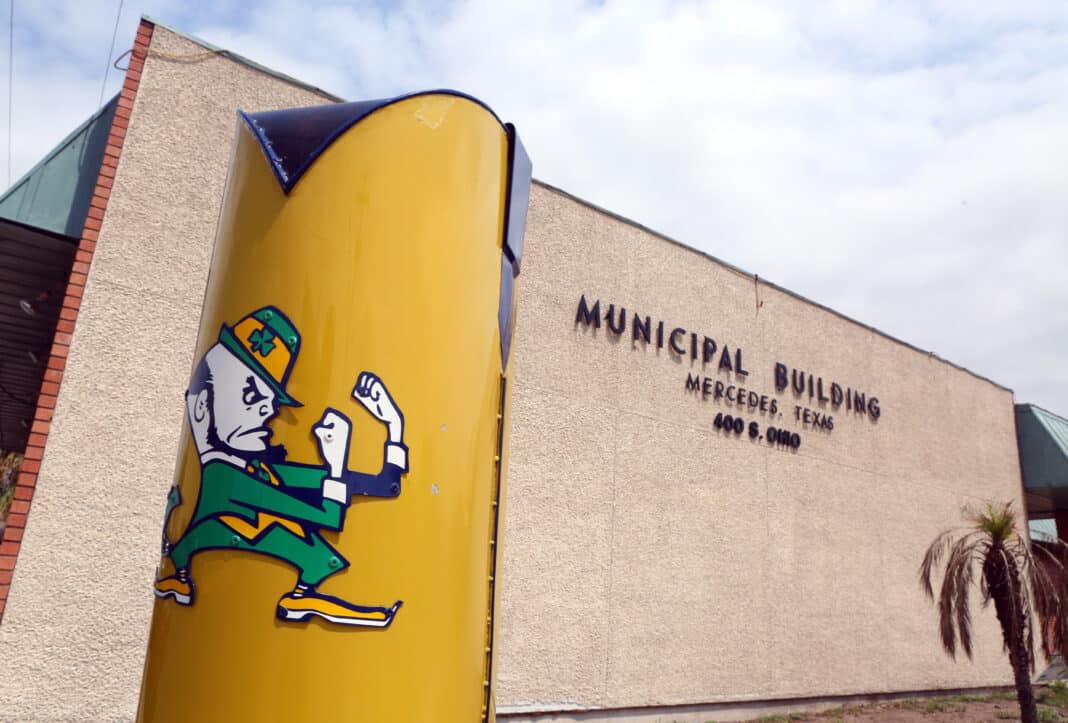Have Bitcoin, Ethereum, Dogecoin or another form of cryptocurrency? Mercedes residents may someday be able to use them to pay their utility bills.
And that day may come sooner than not, after the Mercedes City Commission unanimously voted to have city staff conduct more research into the issue during a commission meeting Tuesday night.
The idea of allowing residents to use digital currencies to pay their utility bills was the brainchild of Place 1 Commissioner Jacob Howell, who said it could be one way to help Mercedes move into the future.
“As we all know, the future is always something of importance. And being innovative and forward thinking is important,” Howell said as the commission began their discussion on the idea.
“Now, this item I feel would not only help push not only business but innovation and future growth and future thinking for the city of Mercedes and for the region. This item does not only just represent today, but it represents plans for tomorrow, as well, and progressive, forward thinking,” Howell said.
Cryptocurrencies, or crypto, are digital currencies that can be used to purchase goods and services. They can also be traded for profit.
With no real-world assets to back up a digital currency such as Bitcoin, it is through trading that cryptocurrency investors generate profit — hoping buyers will pay more for the crypto than they themselves paid.
According to nerdwallet.com, “Cryptocurrencies work using a technology called blockchain. Blockchain is a decentralized technology spread across many computers that manages and records transactions.”
It is that combined effort of multiple computers, often referred to as nodes, which helps make cryptocurrency so secure.
“This network of thousands of nodes around the world vie to confirm the transaction using computer algorithms,” nerdwallet states.
And therein lies another way to profit from cryptocurrency. That process of using multiple peer-to-peer computer networks to confirm cryptocurrency transactions is known as “bitcoin mining.”
With Bitcoin, for example, the miner who can achieve validation of a transaction first receives a new Bitcoin for their efforts.
But, as competition to become the first to validate a transaction increases, so, too, does the computing power needed to mine cryptocurrencies.
Since the invention of Bitcoin in 2009 by Satoshi Nakamoto — a pseudonym for Bitcoin’s anonymous developer — thousands of cryptocurrencies have entered circulation online, each requiring substantial computing resources to mine.
Research by Columbia University’s Columbia Climate School shows that Bitcoin alone consumes more than 700 kilowatt hours of electricity per transaction, and more than 121 terawatt hours per year. That’s more electricity than tech giants Google, Apple, Facebook and Microsoft consume in a year, combined, the school reports. Bitcoin alone consumes more energy in a year than the country of Argentina.
But back in the Rio Grande Valley, should Mercedes approve the use of cryptocurrencies utility bill payments, it would be the first city in Texas to do so.
Thus far, only a handful of other cities in the United States have approved such uses of cryptocurrency, including Williston, North Dakota.
The town, which has a population of just under 30,000, began accepting cryptocurrency payments for utility bills via BitPay, a Bitcoin service provider, just this spring.
And in August, a company called CityCoins unveiled a cryptocurrency called MiamiCoin, which Miami Mayor Francis Suarez hopes to one day be able to use to pay city salaries, among other uses.
“I feel that this is something innovative, this is something that’ll get other businesses and development thinking,” Howell said of the proposal to begin accepting crypto payments in Mercedes.
But some on the commission had questions, including Place 3 Commissioner Jose Gomez.
“Is Mercedes ready for this? … Are we ready for this type of currency? City manager, do you feel good about this?” Gomez asked, directing his questions to City Manager Alberto Perez.
“Whether we’re ready today for cryptocurrency or not, I think it’s worth the effort to look into. What would that look like and how would that work?” Perez said, adding that he is most concerned over the security of digital currency.
Perez also raised concerns over the volatility of cryptocurrency exchange rates before deferring the question to the city’s finance director, Nereida Perez.
Nereida Perez said Mercedes would have to partner with an exchange service provider, but that doing so comes with risk.
“The problem with those is how they’re not geared towards companies yet and also they’re not protected by the SEC. It’s not regulated, at least not right now,” Nereida Perez said.
“They are trying to convince the SEC (Securities Exchange Commission) that it is safe to invest in because it is highly risky because of the exchange rates,” she said.
The finance director worried that the cash value of a cryptocurrency could plummet between the time a resident made their utility payment and when the city attempts to convert it to cash.
“Let’s say a person pays their bill for $200, but by the time we exchange it, we only get $160. We have a loss of $40,” Nereida Perez said.
Indeed, according to investing.com, the value of Bitcoin has dropped nearly 8% in the last week — from a high of $65,471 on Sunday, to a low of $57,014 by close on Thursday.
“The thing is, we’re not investing into it; you’re accepting it as a form of payment,” Howell said.
“That payment can automatically go and get transferred into a cash account or a cash payment,” he said, adding that Tuesday night’s discussion was not meant to make acceptance of crypto as “an overnight thing.”
Still, the majority of the commission seemed wary of the proposal, including Place 4 Commissioner Joe Martinez, who seconded Howell’s motion to look into the issue.
“I don’t think there’s anything wrong with trying to go into innovative ways for people to pay their bills… but I don’t think that we’re fully prepared and I just don’t want us to jump in to something,” Martinez said.
“I really encourage you to rescind the motion, if possible, for us to research and look into what would it take, what are the pros and cons, and how we can develop a plan to make this possible,” he said.
In the end, Howell amended his motion to direct city staff to further research the issues. The motion passed unanimously.





